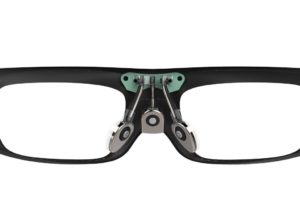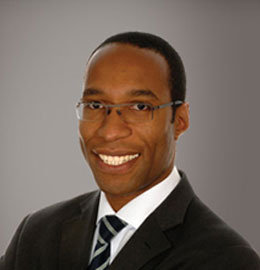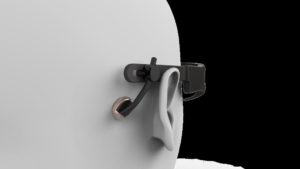A Brighton and Hove surgeon is pioneering “smart specs” which could help treat facial palsy, monitor the wearer’s mood and even steer wheelchairs.
Charles Nduka, 47, who lives in Kemp Town, initially aims to help rehabilitate people with facial palsy but is keen to broaden the medical uses of the high-tech specs.
Mr Nduka is a consultant plastic and reconstructive surgeon at Queen Victoria Hospital, in East Grinstead, and at Spire’s Montefiore Hospital, in Hove.
He is also the chief scientific officer at Brighton start-up Emteq, which is working on the £800,000 project to develop the smart specs with the Queen Victoria Hospital.
The company, based at the Sussex Innovation Centre, on the Sussex University campus at Falmer, is also working with the charity Facial Palsy UK and researchers at Coventry and Nottingham Trent universities.

The technology – Facial Remote Activity Monitoring Eyewear (Frame) – detects when a patient is smiling and is being developed by researchers to help rehabilitate people with facial palsy.
The team behind the technology believe that it may lend itself to other future applications. These include providing feedback on a person’s mood if, for instance, they have depression. It may also enable someone who is tetraplegic to control a wheelchair.
The project is funded by the National Institute for Health Research through its Invention for Innovation Programme.
The technology will centre on the use of miniature sensors in the frame of the glasses to measure facial symmetry by tracking the movement of muscles and the intensity of those movements.

Mr Nduka said: “People with facial paralysis or stroke can have a very limited awareness or control of any abnormal facial movements they may have. So without proper feedback, their condition may worsen and lead to permanently abnormal movements.
“But by wearing a pair of glasses which provide real-time muscle feedback, patients would be able to practice their exercises without having to stare at themselves in the mirror regularly.
“Rather than spending short periods of time exercising, their rehabilitation would become part of their day-to-day interactions.
“This could really transform the ability of both clinicians and patients to monitor their progress. The glasses would help quicken their recovery, provide significant improvements in their facial function and give them a better quality of life.”
Philip Breedon, professor in smart technologies at Nottingham Trent University, said: “This is an exciting wearable technology and could make a major difference to thousands of people’s lives.
“More than 25,000 people are diagnosed with facial palsy in the UK each year, with around 8,000 of them being left with a permanent disability.”

Professor Breedon said: “The cost to the NHS of providing patients with the recommended 45 minutes of personalised rehabilitation per day is more than £62 million a year.
“But this eyewear could enable patients to practice more effectively while carrying out their everyday tasks and generate considerable efficiencies for the NHS.”
People with facial palsy currently practice facial exercises in front of a mirror. But many dislike seeing their own reflection as it reminds them of their condition and can make them feel discouraged and stop exercising altogether.
The Frame specs will not only allow patients to practice exercises discreetly while going about their lives but will give them useful information on their progress.
A patient’s smartphone can provide him or her with a schedule of routines, give live feedback, data on muscle tone, number of repetitions, weekly progress and historical information.










I am facinated by this technology, although 8,000 people left disabled is probably an understatement. I have had FP through Ramsay Hunt Syndrome for the past 5 years and as the Senior Physio at the local hospital said, there is no one trained to advise me on facial exercises opr rehabilitation. Technology is wonderful if it works and if it can be made available to those who need it, regardless of post code.